Saturday Feb 21, 2026
Saturday Feb 21, 2026
Wednesday, 29 November 2023 00:10 - - {{hitsCtrl.values.hits}}
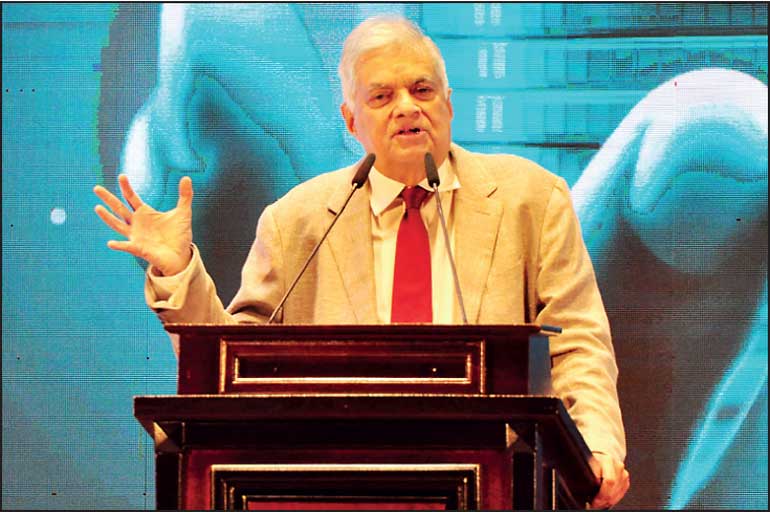
President Ranil Wickremesinghe
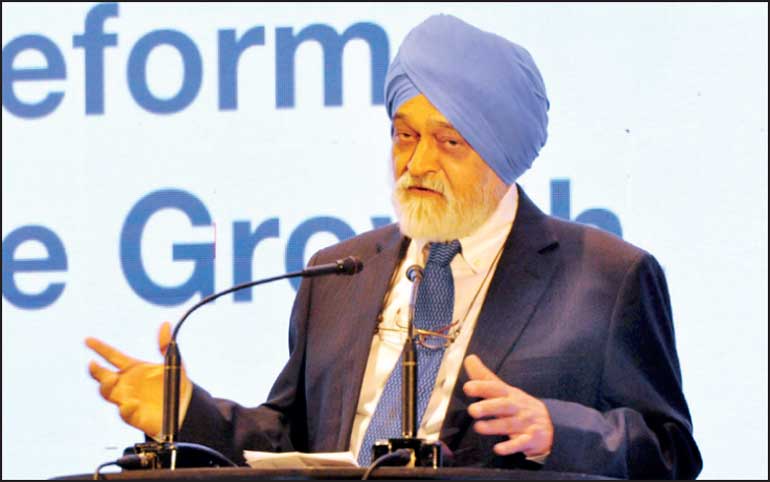
Deputy Chairman of the planning Commission of the Republic of India (2004-2014) Montek Singh Ahuwalia
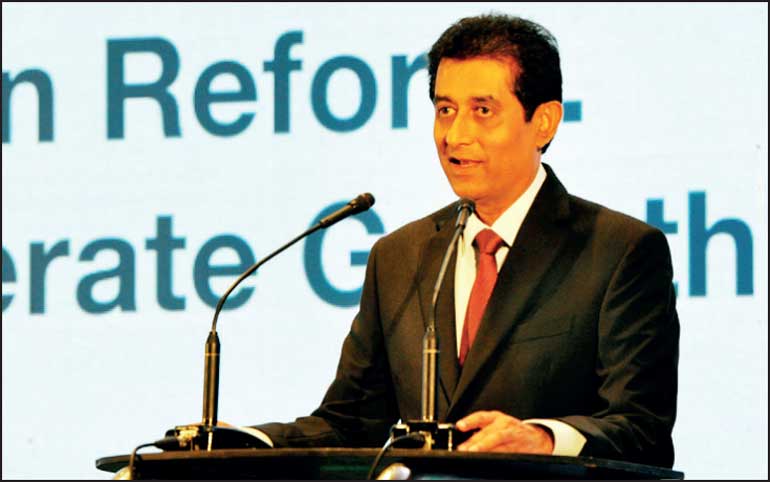
Ceylon Chamber of Commerce Chairman Duminda Hulangamuwa
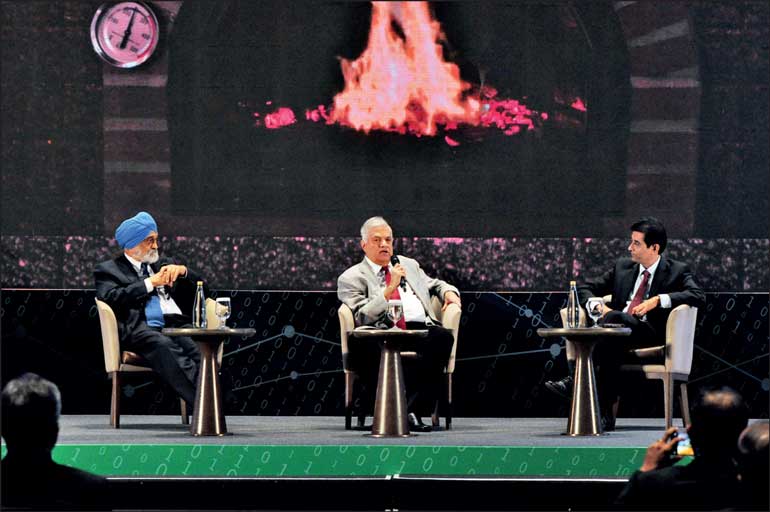
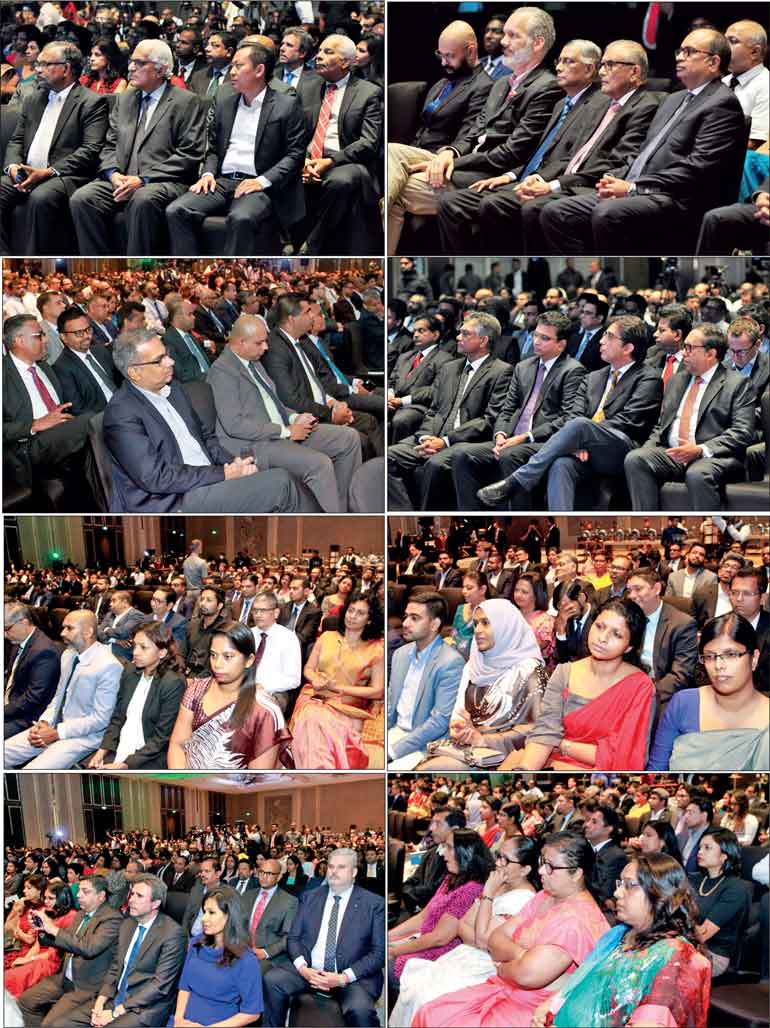
By Darshana Abayasingha
President Ranil Wickremesinghe yesterday said there is no turning back for Sri Lanka now, the country must forge ahead and the crisis became an opportunity, we must ride on it.
Speaking at the inauguration of the Ceylon Chamber of Commerce Sri Lanka Economic Summit 2023 President said significant work has taken place in good faith with regards to debt restructure, and contrary to many expectations Sri Lanka has been able to successfully navigate the process. He noted the country is relying heavily on the long-term extension of debt, which means the economic principles on which the country operates into the future would be based on these negotiations. “If we go away from it, the creditors are entitled to act, so we have to work within this framework.” President Wickremesinghe said, he often thought to himself what might be the best course, and stated he is confident on the chosen path. “We should have done it earlier,” he stated.
“If I do not do this no one else is going to do it. If we don’t have a long-term agreement someone can turn it back. We cannot be auctioning non-existent resources. This is a radical restructure. There wasn’t any real consensus, but for how long are we going to be a beggar nation? Are the trade unions and political parties ever going to agree on this? We are asking for tax-payer from other countries, because we got it wrong,” the President remarked.
Ceylon Chamber Chairman Duminda Hulangamuwa
Earlier Ceylon Chamber Chairman Duminda Hulangamuwa, welcomed the audience to the Economic Summit in what he termed was a year of economic stabilisation. However, he noted that stabilisation has often been the easy part for Sri Lanka, which has repeatedly failed to see the other complimenting reforms that would sustain the stabilisation of the economy. Hence 2024 is a pivotal year, he said.
“We just saw the presentation of the National Budget which aims to balance the fiscal targets and the need for developments and welfare for the public. What has failed to implement the reforms need is a lack of consensus amongst political parties, civil society, unions, private sector and the public on the reform measures. For example, measures in the past such as State Enterprise reform have been met with stiff opposition, and we have not taken the required changes and as consequence we are this this point. As a Chamber we aim to drive forward a consensus in our policy advocacy work, speaking to various political groups, unions, civil society and think-tanks,” Hulangamuwa stated.
Considering the status of the economy, the summit is themed in two parts, Sustain Reform and Accelerate Growth. The summit aims to discuss the crucial elements of the reform process such as SOE reform while also discussing solutions to get growth back on track.
“As the private sector, we cannot be happy with an economy growing under 3%, we need it to expand by 4-5% at least annually, to create new jobs and innovate. The summit will hear case studies from countries like Vietnam where the reforms of the Government ran in parallel to the entrepreneurship and growth ambitions of companies, in particular to export,” Hulangamuwa said.
The Ceylon Chamber Chairman added that Sri Lanka is at a crucial point in its economic development trajectory and there are difficult decisions to be made, and steps taken now by the Government and private sector will determine how we emerge from our current challenges. Sri Lanka must complement tax reforms with other structural reform related to trade, investment and ease of doing business. Hulangamuwa appreciated the efforts taken by the Government over the last 16 months to stabilise the economy, as the country engages in healthy debate, advocate for necessary change and call for accountability. “We do so bolstered by the knowledge that while we may travel different paths, the destination remains the same, that of economic growth and prosperity to the people.”
Picking up from his post-budget 2024 discussion with the Daily-FT and University of Colombo MBA-Alumni Association, President Wickremesinghe said Sri Lanka is entering a new political era, where every party has to work within a specific framework. “If they are breaking it, they have to tell the country and do it”. He noted that if Sri Lanka is unable to balance its budget in a sustainable fashion, the country will face another crisis within a decade and therefore everyone must work to crate change. Sri Lanka must be competitive and develop an export economy, powered by a digital economy that has local produce strong enough to compete with imports. Sri Lanka will soon have many more Free Trade Agreements in place and tariffs will have to be adjusted downwards to meet the demands, he said.
Sri Lanka is tapping first on low hanging fruit like tourism, Wickremesinghe details, and noted the initial target of 2.5 million was still low, and even when it reaches 5 million tourists the country must target to earn $ 500 at a minimum. He added Sri Lanka must say goodbye to minimum room rates. “Which country has minimum rates? We have to open up to take tourism deeper into the city. So, don’t complain when the President’s House is shifted to Madiwela,” he enthused. Sri Lanka must rethink its tourist policies, and tap large markets like India and China.
Modernising agriculture for exports was the other aspect the President stressed on, noting Sri Lanka could become self-sufficient with paddy harvest from the dry zone alone. He noted legislation was changed to grow any crop in the wet zone paddy fields, whilst a further 100,000 acres from System A and B in Mahaweli schemes will be released for farming. The government will release a further 300,000 acres and if plantations could add another 400,000 of agri-produce that would supplement agricultural produce and exports, the President noted.
“Renewable energy is another new area to look at. We have excess renewable energy. We have sufficient wind power, and now connectivity with India. There is over 100 GW of green hydrogen in Sri Lanka. You can turn this country around with all of that. We must open the Eastern Province for tourism with regional flights, we have to tap bigger markets. That is why we want FTAs with South East Asia. We are working with Bangladesh and India to have a comprehensive economic partnership. Land connectivity with India is important. We must think anew. I have started the largest privatisation in Sri Lanka, giving away government apartments to people. That is much larger than the privatisation of Sri Lankan Airlines, and infuses confidence to the economy. There is no turning back like I said, we must forge ahead,” Wickremeseinghe stated.
Keynote Speaker Montek Singh Ahluwalia
The Keynote Speaker at the event was Montek Singh Ahluwalia, a leading Indian Economist and Deputy Chairman of Planning Commission of India, who compared Sri Lanka to India, when the sub-continent went through its recession in the early 90s. He was tasked with providing lessons to Sri Lanka, based on the Indian experience.
“I really don’t think you need lessons, your President has outlined a very comprehensive agenda and all you need to do is get on with it. This is not reform, this is radical restructuring, the President is right. There are differences between the Indian crisis in 1991 and your situation today. That was a more classic macro-economic imbalance. In Sri Lanka what has happened over the last few years has created deeper issues with inefficiencies etc. which needs deeper reform. In India it was different, the global economy was different. Sri Lanka is doing it in more difficult times when the global situation is rather difficult. Never waste a crisis, and if you do what has been spelt out then you won’t waste it. People have seen what it was like two years ago, and that should create willingness to do something different. It gives you a window of time to act and do something different. In India we addressed macro-economic instability within a short time. All the reforms and opening up capital markets made the difference, but it happened over a period of time,” Ahluwalia said.
The Indian economist also noted that a good indication of the range of policies that are being considered can be drawn from the fact the Government has invited the IMF to do a diagnostic on governance. He said Sri Lanka is the first country in Asia to do that, and this is relevant to other countries as well. If it is done here it will become easier to do elsewhere. But, it is important to get the details right. If Sri Lanka doesn’t set up institutions right with the right people and structures, they will not work. If done right it will give lot of corrective signals, and give indications on the seriousness of Sri Lanka’s commitment, he added.
“How do we get political support to make these changes? Democracy is a confrontational form of Government. It is important to have sufficient debate, but show it will be good for the country and that there will be positive effect. Politicians will criticise government, but deep down they will know this may be right, and if they come to power what might be best to go forward with. Dr. Manmohan Singh found he was being criticised when he was driving the reforms, but later he realised that they knew that this was the right thing to do. In fact, the Opposition Leader met him and said this is politics, and to say his course but make sure people know there’s something in it for them. We have a very contentious system in India. Political opposition does not necessarily mean the end of a policy. For example, the digital identity was opposed by the BJP. But when the BJP came into power they actually strengthened it.”
Ahluwalia said Sri Lanka must remember to engage poorer segments and ensure communication and a degree of welfare. The business class is aware, he said, and other segments too must be made aware and feel tangible change. Land being handed over to those who don’t have ownership in Sri Lanka is a good start he said, and send the correct signals.
President Wickremesinghe agreed with Ahluwaila that countries like Sri Lanka and even India could learn from systems such as the UK, where the entire revenue system is digitalised. The President said a parliamentary oversight committee will be appointed to oversee reforms and will drive necessary reforms to see necessary changes.
Ahluwiala, a former IMF consultant added: “I have been told the IMF gives more resources to larger countries and that countries in Africa are not given enough attention. I think the IMF has now realised that a cookie-cutter approach does not work and it must be tailored. And its not for the IMF to put everything right. There are a 100 things wrong. Its up to them to identify the big things that will help capital and investment to flow. Many of these things have to be done over a long period of time. What we need to do is see what can be done in a short space that will have a maximum impact over a long period of time.
-Pix by Sameera Wijesinghe